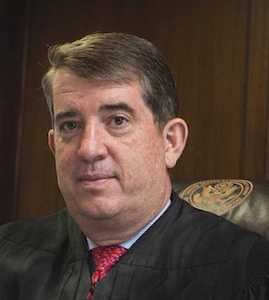ERCOT, operator of the Texas electric grid, says it was just following orders when it charged Brazos Electric Power Cooperative Inc. roughly $2 billion for power and related services provided during the deadly storm in February — a staggering bill that drove Brazos, the state’s largest and oldest electric cooperative, into bankruptcy.
In a motion filed last week, ERCOT said it had no choice but to jack up the wholesale price of electricity to as much as $9,000 per megawatt-hour — or 300 times the normal rate — during the storm. The motion seeks dismissal of a complaint by Brazos challenging ERCOT’s claim for just under $1.9 billion in Brazos’s Chapter 11 bankruptcy case. Brazos filed its complaint Aug. 18 in an adversary proceeding.
“ERCOT set those prices upon orders of the Public Utility Commission of Texas … that ERCOT was statutorily obligated to obey,” the motion to dismiss said.
Brazos petitioned for Chapter 11 bankruptcy protection March 1, two weeks after Winter Storm Uri roared into Texas, unleashing snow, sleet, ice and subfreezing temperatures across the state. The brutal weather led to a massive failure of power-generating facilities, which left more than 4.5 million homes and businesses without electricity, many for several days.
At one point during the storm, ERCOT officials acknowledged, the overtaxed Texas grid came within five minutes of a total collapse. With power scarce and demand colossal, the prices ERCOT imposed on wholesale suppliers like Brazos soared.
Chief Bankruptcy Judge David R. Jones of the Southern District of Texas is presiding over Brazos’s bankruptcy case and adversary proceeding. Under Jones’ leadership, Houston — which is the seat of the Southern District — has emerged as a national venue of choice for resolution of complex, high-dollar business bankruptcies.

Judge David R. Jones
Among others, Brazos is represented by Jason L. Boland, Paul Trahan, Michael M. Parker and Steve A. Peirce from the Houston, Austin and San Antonio offices of Norton Rose Fulbright; Lou Strubeck Jr. and Nick Hendrix of O’Melveny & Myers in Dallas; and Lino Mendiola and Michael Boldt of Eversheds Sutherland in Austin.
ERCOT is represented by Jamil N. Alibhai, Kevin M. Lippman, Deborah Perry and Ross H. Parker of Munsch Hardt Kopf & Harr in Dallas.
ERCOT’s $1.9 billion claim is by far the largest pending against Brazos; its approval claim could complicate the Waco-based cooperative’s efforts to emerge from bankruptcy as a robust, reorganized business entity.
To put the matter into some perspective, Brazos, in court documents, offered this comparison: The amount sought by ERCOT just for the week of the winter storm is more than Brazos’s total revenues from wholesale delivery of power in 2019 and 2020 combined.
Winter Storm Uri Details Seven Months Later
Established in 1941, Brazos is a nonprofit cooperative owned by 16 member companies. Its service area spans 68 counties from the Panhandle to Houston, delivering electricity to about 1.5 million Texans.

Lou Strubeck
ERCOT – the Electric Reliability Council of Texas – is an independent nonprofit certified by the PUC to operate the Texas electric grid, which dispatches power to more than 25 million customers. ERCOT oversees transmission and generation facilities in 213 of Texas’s 254 counties, encompassing 70% of the state’s geographic area and 90% of its population, essentially making Texas the only one of the contiguous 48 states with its own, standalone electric grid.
By state law, ERCOT is “directly responsible and accountable” to the PUC, which has “complete authority” over its operations, said ERCOT’s motion to dismiss.
It added, “any challenge by Brazos regarding pricing during Winter Storm Uri or ERCOT’s actions” would require joinder of the PUC. And since such joinder of a state governmental agency is impossible under the doctrine of sovereign immunity, it said, Brazos’s challenge of the $1.9 billion claim is fundamentally flawed.
According to the National Oceanic and Atmospheric Administration, Uri is the costliest U.S. winter storm on record, with damages across several states estimated at $20.4 billion.
State health officials say at least 210 people died in Texas as a direct or indirect result of the storm; other, unofficial estimates place the death toll much higher.
During Uri, with demand for electricity hopelessly outstripping the supply, the three-member PUC met in an emergency session and ordered ERCOT to impose so-called “scarcity pricing” of electricity, intended, in the agency’s words, “to encourage any and all generation able to come online.” The result was the huge, temporary spike in what ERCOT paid producers for electricity, and, consequently, in what Brazos and other providers were charged to buy that electricity.
In challenging ERCOT’s claim against it, Brazos didn’t question the PUC’s authority over ERCOT or the agency’s decision to order emergency pricing during the storm. (The PUC’s actions, however, are being challenged in a separate, state case pending in the Third Court of Appeals in Austin. In that case, Luminant Energy Co., Texas’s largest electricity producer, alleges that the PUC “rushed to interfere with the market and raise electricity prices” in violation of the emergency rulemaking provisions of the Texas Administrative Procedures Act; then, in cahoots with ERCOT, secretly kept the $9,000 maximum rate in place for a day and a half after forced rolling blackouts ended. A dozen energy companies — but not Brazos — have intervened in the appeal on Luminant’s side.)

Jamil Alibhai
Brazos’s complaint contesting ERCOT’s $1.9 billion claim sidesteps issues related to the PUC’s actions; rather, Brazos frames its dispute with ERCOT as essentially contractual: What was ERCOT legally obligated to do, what did it do, and what didn’t it do?
Brazos contends ERCOT violated its own protocols and its contract with Brazos by failing “in spectacular fashion” to ensure the reliability of the Texas electric grid and by imposing “exorbitant and excessive” electric prices, which were “avoidable and constructively fraudulent.”
ERCOT, Brazos claims, knew at least week ahead of time that a severe, potentially dangerous cold wave was rolling toward Texas, but was “slow to act” to avert disaster. For example, Brazos says, ERCOT should have more closely monitored the coming storm, kept energy-market participants better informed, redeployed resources, and alerted the public to the need for energy conversation.
“ERCOT’s inaction caused dramatic hardship across the state,” Brazos said in its complaint.
Moreover, it said, ERCOT knew for decades that extreme cold weather could hobble the Texas electric grid, resulting in rolling blackouts, sky-high wholesale prices and grave harm to utility customers. The Uri calamity “was entirely preventable,” Brazos said, had ERCOT done its job.
Brazos Bankruptcy Litigation
Until Uri, Brazos was a model of stability, it said, with “an impeccable financial record” and consistent credit ratings of A+ or A. For 80 years, it said, it reliably met the generation, transmission and distribution needs of its members, even as the population of Texas ballooned.
It blames its bankruptcy mostly on ERCOT’s whopping prices during Uri, as well as a lack of available fuel to generate electricity through the grid that was, and is, ERCOT’s responsibility.
In a March 6 letter to the Texas Legislature, ERCOT said at least 212 generating units at 219 power plants lost all or some generating capacity at various times and for varying durations during the storm.

Jason L. Boland
Brazos is asking Jones to materially reduce ERCOT’s $1.9 billion claim, saying it overstates what Brazos legitimately owes by “hundreds of millions of dollars, if not over a billion dollars.”
Further, it asks that any amount the judge allows be reclassified as a general unsecured claim rather than a priority claim. That would shove ERCOT to the back of the creditors’ line; in many Chapter 11 reorganizations, general unsecured claims end up worth pennies on the dollar.
ERCOT, for its part, argues that Jones should either dismiss Brazos’s challenge or abstain from ruling on it altogether under a 1943 U.S. Supreme Court decision, Burford v. Sun Oil Co.
Put simply, Burford held that federal courts may defer to the states – butt out, in other words – on matters more appropriately decided at the state level. These include matters in which state courts are likely to have greater expertise: those involving significant, unsettled areas of state law; those governed by state regulatory or administrative procedures; and those in which ruling on a federal issue would require a federal judge to delve into state law.
Those factors describe Brazos’s adversary proceeding complaint “to a remarkable degree,” ERCOT’s motion contended.
“To decide Brazos’s claims,” ERCOT said, Judge Jones “would have to determine the validity and applicability of the PUC… orders, the propriety of ERCOT’s interpretation and implementation of those orders, and a variety of other issues under Texas’s comprehensive and complicated regulatory scheme for electric utilities” – all matters, in ERCOT’s view, best left to Texas courts, the Texas Legislature, and state agencies including the PUC.
Once Brazos has a chance to respond to ERCOT’s dismissal motion, Jones is likely to schedule a hearing, possibly by October.
When outage hearings infuriated legislators, winter came to top brass at PUC and ERCOT
By Bruce Tomaso
After the rolling blackouts, heads rolled in Austin.
Bill Magness, ERCOT’s $813,000-a-year president and CEO, was fired on March 4, two weeks after Winter Storm Uri wreaked havoc with the state’s electric power system.
Three days earlier, DeAnn Walker, chairwoman of the Public Utility Commission of Texas, resigned. PUC commissioners, appointed by the governor, are paid $201,000 a year.
Both Magness and Walker had been fiercely criticized — by Republicans and Democrats alike — for their testimony before separate House and Senate committees looking into the Uri debacle. Lt. Gov. Dan Patrick, in calling for their removal, blamed misjudgments by Magness and Walker for causing “tragic loss of life.”
ERCOT, the Electric Reliability Council of Texas, operates the Texas power grid under the auspices of the PUC.
Several members of ERCOT’s board of directors have stepped down as well. ERCOT’s website currently lists five of the board’s 16 seats as vacant, including those of the chair and vice chair.
At the PUC, Walker had scarcely finished cleaning out her desk when her two fellow commissioners, Shelly Botkin and Arthur D’Andrea, resigned.
The Texas Legislature in its regular session this year approved an expansion of the commission to five members from three. The measure authorizing the change, Senate Bill 2154, passed with bipartisan support in both the House and Senate. It was signed by the governor on June 18 and took effect immediately.
The bill specifies that “at least two commissioners must be well informed and qualified in the field of public utilities and utility regulation.” (Why two? an innocent might ask. Why not five?)
